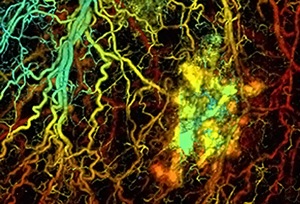Oct 1 2013
Cancer researchers have been limited by current imaging technology in their ability to detect not only structure and function of tumors, but also tumor cell circulation. A technology proposed by Lihong Wang, PhD, at Washington University in St. Louis, may hold the key to reaching this goal.
 Lihong Wang’s research is dedicated to the development of novel imaging technologies. The photoacoustic microscopy image shows a melanoma tumor. Such an imaging capability is expected to play an important role in both preclinical and clinical applications.
Lihong Wang’s research is dedicated to the development of novel imaging technologies. The photoacoustic microscopy image shows a melanoma tumor. Such an imaging capability is expected to play an important role in both preclinical and clinical applications.
Wang, the Gene K. Beare Distinguished Professor of Biomedical Engineering at the School of Engineering & Applied Science, has received a 2013 Transformative Research Award from the National Institutes of Health (NIH). He was one of only 10 recipients of the award, given to scientists proposing highly innovative approaches to major contemporary challenges in biomedical research. The award promotes interdisciplinary approaches by investigators who propose research that has the potential to create or overturn fundamental paradigms.
The award was one of 78 totaling $123 million made by the NIH in its High Risk-High Reward program, supported by the NIH Common Fund.
The goal of the five-year, $3.5 million grant is to translate this technology, called single-cell label-free photoacoustic microscopy (PAM), immediately into the clinic for cancer screening, detection, prognosis and monitoring.
Specifically, PAM will be used for imaging circulating single red blood and tumor cells as well as single circulating tumor cells. The proposed single-cell label free imaging in living humans has the potential to facilitate translation of basic research to the clinic, detect metastases at an early stage and to produce tumor response to the therapy. As a result, it may enable earlier therapeutic interventions and curative surgical treatment and improve survival of patients with cancer.
A leading researcher on new methods of cancer imaging, Wang has received more than 30 research grants as the principal investigator with a cumulative budget of more than $40 million. His research on non-ionizing biophotonic imaging has been supported by the NIH, National Science Foundation (NSF), the U.S. Department of Defense, The Whitaker Foundation and the National Institute of Standards and Technology.
Wang and his lab were the founders of a new type of medical imaging that gives physicians a new look at the body’s internal organs, publishing the first paper on the technique in 2003. Called functional photoacoustic tomography, the technique relies on light and sound to create detailed, color pictures of tumors deep inside the body and may eventually help doctors diagnose cancer earlier than is now possible and to more precisely monitor the effects of cancer treatment — all without the radiation involved in X-rays and CT scans or the expense of MRIs.
In September 2012 he received one of 10 NIH Director’s Pioneer Awards from among 600 applicants. The award supports individual scientists of exceptional creativity who propose pioneering — and possibly transforming — approaches to major challenges in biomedical and behavioral research. He also has received the NIH FIRST, the NSF’s CAREER Award, the Optical Society’s C. E. K. Mees Medal and IEEE’s Technical Achievement Award for seminal contributions to photoacoustic tomography and Monte Carlo modeling of photon transport in biological tissues and for leadership in the international biophotonics community.